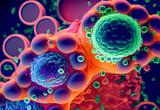New Study Reveals Some Senescent Cells Aid Healing, Challenging Anti-Aging Approaches
December 16, 2024
Senescent cells are crucial for various biological processes, including tissue regeneration, immune system modulation, and cancer suppression, highlighting the need for a balanced treatment approach.
The study emphasizes the complexity of senescent cells, suggesting that a one-size-fits-all approach to eliminating them oversimplifies their diverse functions.
Researchers classified senescent cells into two types based on gene expression: those expressing p16 and those expressing p21, each with differing effects on the body.
These cells, which accumulate with age, have damaged DNA and are linked to several diseases, including diabetes, dementia, and cardiovascular conditions.
A specific study on p21 cells found that their removal from young female mice accelerated wound healing by approximately 25%, contrasting with the beneficial effects of p16 cells.
Future research aims to further investigate the role of p21 cells in wound healing, especially in contexts like diabetes and aging, and to develop targeted therapies.
Lead researcher Ming Xu emphasized the necessity of further studies into the heterogeneous nature of senescent cells and their varied functions across different contexts.
Overall, the study underscores the importance of understanding the diverse roles of senescent cells to enhance health and extend lifespan without adverse effects.
While past studies indicated that removing senescent cells from animals like mice can extend lifespan, this research shows that not all senescent cells have negative effects.
The findings suggest potential advancements in anti-aging therapies by focusing on eliminating harmful senescent cells while preserving those that are beneficial.
Additionally, the research indicated that p21 cells, which are derived from connective tissue, skin, and the immune system, exhibit a distinct pro-inflammatory profile compared to p16 cells.
Recent research from the University of Connecticut, published in the November 2024 issue of Nature Aging, reveals that not all senescent cells are detrimental; some actually play beneficial roles, particularly in wound healing.
Summary based on 2 sources
Get a daily email with more Science stories
Sources

Medical Xpress • Dec 13, 2024
Some aging cells heal wounds, others cause harm: Study shows how to distinguish between the two
Earth.com • Dec 16, 2024
Not all aging cells are bad, some actually help to heal the body